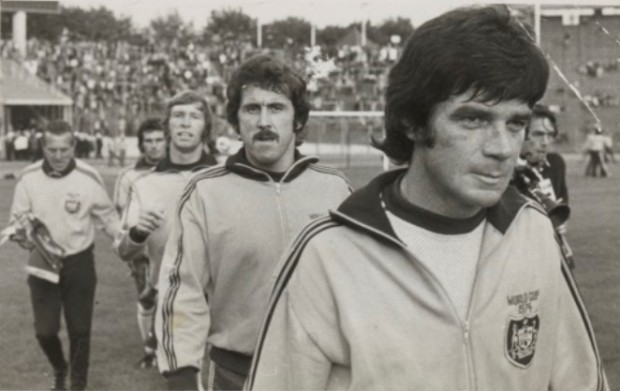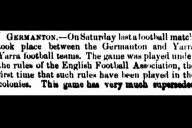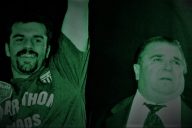On the eve of the 17th Johnny Warren Memorial Cup, Shoot Farken brings you a piece by Mark Gojszyk on his pilgrimage to the Jamberoo Pub and his encounter with the Warren family as they reflect on Johnny Warren and his legacy.
A short drive south of Wollongong is Jamberoo, a town adorned in history and refusing to cooperate with time. Here, the fields are green and open, the roads winding, the buildings neglected, and the pub brimming with locals.
But, it’s no ordinary pub. It’s the iconic Jamberoo Pub, which is owned by Ross Warren, the eldest brother of Johnny Warren.
Gazing through the halls, every room is decked out in photos, jerseys, banners, trophies and posters from the past. It’s a living, breathing museum, a pub that honours the roots that made this game great.
Walking in are Ross, Geoff and Jamie Warren. Only one man is missing — the original Captain Socceroo, Johnny Warren, the most celebrated name in Australian football. His memory lives on through the memorabilia etched along the walls.
Geoff and Ross, Johnny’s brothers, begin to recollect their early days of football, which included travel for the local protestant church competition.
‘We’d travel from Botany Bay to Gladesville and Parramatta. It was a fair drive in those days. If you couldn’t get enough petrol you had to stop out of town and switch over to kerosene. It was incredibly dangerous,” Ross recalls with wry laughter.
Johnny’s brothers don’t seem at all fussed when the topic of early immigration is mentioned.
“Later on when migration started, the clubs were like the United Nations. There were so many different foods and languages,” Geoff adds.
“Sometimes it wasn’t a place to take the wife and kids because there could be a brawl, or bad language. It did keep a few people away.
“But we never had trouble mixing, no discrimination.”
Like Trevor though, they do recall the wider media detesting the game.
“It was the outside press probably trying to stir up trouble. It was ‘sheilas, wogs, and poofters’ that played the sport,” Geoff says, echoing the now famous title of Johnny’s biography.
They also mention how schools initially did not even acknowledge football as a legitimate sport at the time.
“Football was never in the GPS (Athletic Association of the Great Public Schools of NSW). That’s different now. There are more football teams than rugby union.”
As for the experiences of the brothers growing up with Johnny? Well, that was a bit of a non-event.
“Johnny? Didn’t see him much. He was always last out of the dressing room. The family would be waiting there for him and he’d walk right past,” they all joke.
Jamie, Johnny’s nephew, recalls his own experiences years later growing up with the game.
“Something that sticks out from when I was very young was going to the St George games. (Late journalist) Lou Gautier would sell Soccer World newspapers and he would go around saying ‘Soccer Vorld, Soccer Vorld!’”
But it was his incredible journey to Brazil with his uncle that proves the most memorable.
“Uncle John was going over there for a study tour to find out what the Brazilians’ secret recipe was that made them so good at football. He took me along to train at a local club.”
“There was an older guy over there working for SBS named Alfredo, and he told John a trial was lined up with Palmeiras, but the club didn’t know anything about this.
“So Uncle John gave Alfredo a piece of his mind, and we ended up staying in Sao Paolo for the night.
“John went out that night and left me in the room. He was pissed off. He came back home in the morning, snored his head off for about three hours, woke up and said we were going to Rio to the head office of the Brazilian Football Confederation.
“He introduced himself and met with the vice president. After about 15 minutes he organised a full-time chaperone to take us to the two biggest clubs in Rio to choose from.
“I chose to train with Flamengo for six weeks, and at the end of those six weeks they invited me to come back next year.”
But, like the “supposed curse” that prevented the Socceroos from qualifying for World Cups for over three decades, Jamie was struck down by misfortunes of his own.
“A guy looking after me noticed I was getting injured lots, so he told me to write my name and date of birth on a piece of paper. He took it to a lady on the side of a street with ‘special powers’, and she described my conditions perfectly, despite never having seen me.”
“She gave me this special routine to get rid of supposed ‘evil spirits’. I had to boil onions and garlic and bathe in them for three days in a row, and then go to a street corner and put 10 coins in a circle and light a candle in the middle of them. Then, I had to say a prayer and take the onions and garlic to the beach and throw them in the water, and apparently that would fix it,” Jamie recalls with great precision.
When asked if that did the trick, Jamie smiles and laughs: “I’ve had four broken legs. I think she was taking the piss.”
“Apparently a player I had an argument with put a curse on me and wanted me out of Brazil.”
When asked about Johnny’s achievements, including his Socceroos’ captaincy, World Cup participation, domestic success, and post career advocacy to raise football’s profile in Australia, all three agreed his work was commendable both on and off the pitch.
“He never got the recognition he deserved as a player. He was a team player. I always thought he should’ve been playing up front instead of doing all the donkey work,” Geoff laughs.
“He had many achievements once he got into the media and made his presence felt. It couldn’t have gotten any bigger than that.”
Jamie describes Johnny’s likeable personality as the reason he was so widely respected.
“Being a football person and excelling in football media, he was the type of guy who you’d meet and after five minutes think you’d known him all your life. In the football world, people appreciated his authenticity and friendship.”
It was Johnny’s tireless efforts to gain respect for football from the public and improve facilities and standards that led to many reforms in the game. Unfortunately, Johnny didn’t get to see his hard work come to fruition, dying in 2004 just before Australia qualified for their first World Cup in 32 years.
“It was very sad he didn’t see that, but he would quite often say the game is improving and it will happen. He was quite confident that the game would be where it is now,” Jamie says proudly.
A footballing foundation that Johnny helped establish is now named after him, with Jamie the executive chairman. He explained its role:
“After the 2002 World Cup, Uncle John was approached by NSW premier Bob Carr. The aim was to put in a bid to host the World Cup, because even though Australia wasn’t in it, as it was in our time zone, Australia went nuts over it. Politicians wanted to know why that was, why we weren’t there, and what we needed to do to get there.”
“John went with journalist Andy Harper and spent three months writing the Premier’s Soccer Taskforce Report.
“Out of that report there were 11 recommendations. They included: establish a NSW soccer foundation primarily aimed at improving youth development systems; appoint a technical director; call the game ‘football’; use it as a tool for democracy; enter the Asian confederation; establish the A-league; and promote women’s football and futsal.
“It was aimed at NSW but it was really an agenda to reform the game nationally.
As a result, the federal government ordered an inquiry into the game, called the Crawford Report.
“When the governing body was reconstituted, that report pretty much became the FFA’s role to implement those recommendations.”
Therefore, with the new governing body, Football Federation Australia (FFA), now in charge, the role of the foundation has changed in recent times.
“We have a new strategic plan and new commercial model. In June, directors Les Murray and Craig Foster approached the government for an education-based Johnny Warren Football Institute. The week before the election the government announced a $10 million grant. We now have to talk to the Liberal Party to make sure it’s kept in budget.”
“We could possibly become the leading football education facility in Asia. If you’re a politician with your head screwed on, you should see the benefits that’ll provide for a country trying to break into Asia.
“The sky is the limit if we get the support,” Jamie triumphantly declares.

















[…] https://www.shootfarken.com.au/johnny-warren-a-football-pilgrimage-to-jamberoo/ […]